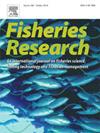鱼叉捕鱼作为不纯公益物的经济效益:佛罗里达州入侵狮子鱼案例研究
IF 2.2
2区 农林科学
Q2 FISHERIES
引用次数: 0
摘要
狮子鱼(Pterois miles 和 P. volitans)是一种高度入侵物种,原产于南太平洋和印度洋。为了控制其急剧增长的数量,佛罗里达鱼类和野生动物保护委员会发起了一项名为 "狮鱼挑战 "的计划,以促进在佛罗里达水域捕捞狮鱼。该计划为垂钓者提供了一个独特的娱乐机会,因为他们需要潜水和用鱼叉捕鱼才能收获狮子鱼。此外,该计划的参与者不仅能从鱼叉捕鱼中获得私人利益,还能获得公共利益,因为他们知道自己为佛罗里达水域的生态系统做出了贡献。本文将鱼叉捕鱼作为一种不纯粹的公共产品来衡量参与者的经济收益,从而为相关文献做出贡献。利用佛罗里达鱼类和野生动物保护委员会提供的数据,采用旅行成本法对钓狮鱼旅行的需求进行建模。数据包括在旅行层面收获蓑鲉的县的信息,但仅限于参与者参加旅行并收获蓑鲉的情况。因此,善于捕获蓑鲉的人被纳入数据的概率较高。为了考虑潜在的样本选择偏差,采用了概率加权法,以收获的蓑鲉平均数量作为替代。结果表明,每位参与者每次旅行的消费者剩余在 965.89 美元到 1,597.36 美元之间,具体取决于模型规格,首选规格表明每次旅行的平均 CS 为 1,117.72 美元。每位参与者的季节性消费者盈余在 4550.45 美元到 3487.91 美元之间,同样取决于模型规格。本文章由计算机程序翻译,如有差异,请以英文原文为准。
The economic benefit of spearfishing as an impure public good: A case study of invasive Lionfish in Florida
Lionfish (Pterois miles and P. volitans) is a highly invasive species originally from the South Pacific and Indian Oceans. As an effort to control its exponentially growing population, the Florida Fish and Wildlife Conservation Commission has launched a program called “Lionfish Challenge” to promote harvesting of lionfish from Florida waters. The program provides anglers with a unique recreational opportunity because they would need to dive and spearfish to harvest lionfish. Furthermore, participants in the program not only gain utility from spearfishing as a private good but also as a public good, knowing that they are contributing to the ecosystem in Florida waters. This paper contributes to the literature by measuring the economic benefit for participants from spearfishing as an impure public good. Using data provided by the Florida Fish and Wildlife Conservation Commission, a travel cost method was applied to model the demand for lionfish fishing trips. Data included information about counties where lionfish were harvested at the trip-level, but only if participants took a trip and harvested lionfish. Therefore, those who are good at catching lionfish had a higher probability of being included in the data. To account for potential sample selection bias, a probability weight was applied, using the average number of lionfish harvested as a proxy. Results indicate that the per-trip consumer surplus per participant was between $965.89 and $1,597.36, depending on model specifications, with the preferred specification indicating a mean CS of $1,117.72 per trip. The seasonal consumer surplus per participant was indicated to be between $4,550.45 and $3487.91, again, depending on model specification.
求助全文
通过发布文献求助,成功后即可免费获取论文全文。
去求助
来源期刊

Fisheries Research
农林科学-渔业
CiteScore
4.50
自引率
16.70%
发文量
294
审稿时长
15 weeks
期刊介绍:
This journal provides an international forum for the publication of papers in the areas of fisheries science, fishing technology, fisheries management and relevant socio-economics. The scope covers fisheries in salt, brackish and freshwater systems, and all aspects of associated ecology, environmental aspects of fisheries, and economics. Both theoretical and practical papers are acceptable, including laboratory and field experimental studies relevant to fisheries. Papers on the conservation of exploitable living resources are welcome. Review and Viewpoint articles are also published. As the specified areas inevitably impinge on and interrelate with each other, the approach of the journal is multidisciplinary, and authors are encouraged to emphasise the relevance of their own work to that of other disciplines. The journal is intended for fisheries scientists, biological oceanographers, gear technologists, economists, managers, administrators, policy makers and legislators.
 求助内容:
求助内容: 应助结果提醒方式:
应助结果提醒方式:


